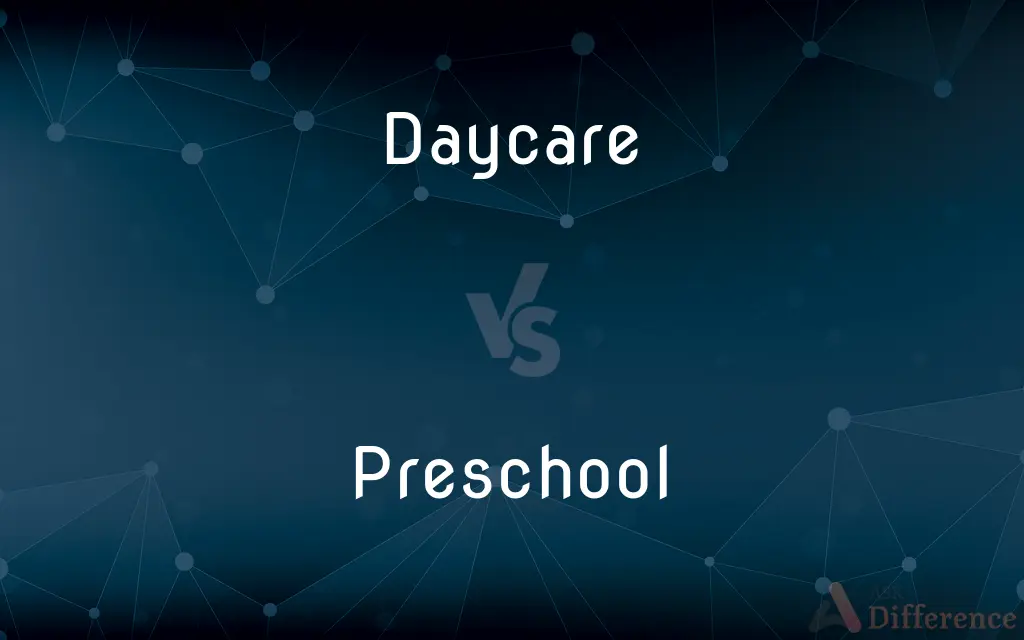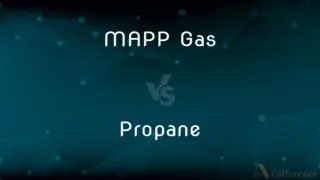Daycare vs. Preschool — What's the Difference?
By Urooj Arif & Fiza Rafique — Published on February 25, 2024
Daycare provides childcare and basic educational activities for a wide age range, focusing on care and supervision, while preschool offers a structured educational curriculum for children typically aged 3-5, preparing them for kindergarten.

Difference Between Daycare and Preschool
Table of Contents
ADVERTISEMENT
Key Differences
Daycare centers are designed to offer a safe and nurturing environment for children while their parents are at work or otherwise engaged. They cater to a broad age range, from infants to school-aged children, providing meals, rest periods, and a mix of play-based and structured activities. The primary focus is on childcare, with an emphasis on socialization and basic learning within a flexible schedule.
Preschool, on the other hand, is an early childhood educational setting for children approximately 3 to 5 years old, aimed at preparing them for kindergarten. Preschool programs follow a structured curriculum that includes activities to develop language, cognitive skills, fine and gross motor skills, and social abilities. Classes are typically held during school hours, and while care is a component, education is the central focus.
The choice between daycare and preschool often depends on the child's age, the parents' schedule, and the family's educational goals. Daycare offers more extended hours and accommodates a wider age range, making it suitable for working parents needing full-day care. Preschool provides an educational foundation and social preparation for elementary school, with a schedule that might better suit families looking for part-time care aligned with a school-like structure.
Both settings play crucial roles in a child's development, offering safe environments where children can learn and grow. Daycares offer flexibility and convenience for families, while preschools focus on early learning and school readiness. Ultimately, the best choice depends on individual family needs, the child's developmental stage, and the quality of the programs available in their area.
Comparison Chart
Age Range
Infants to school-aged children
Typically 3-5 years old
ADVERTISEMENT
Focus
Childcare with some educational activities
Early childhood education
Schedule
Full-day, year-round
School-like schedule, often part-time
Curriculum
Play-based, less structured
Structured, preparing for kindergarten
Hours
Extended to accommodate working parents
Similar to school hours, less flexible
Primary Goal
Provide safe care and basic learning
Prepare children for elementary school
Activities
Mix of free play and guided activities
Educational activities focused on development
Environment
Caring and nurturing, less formal
Educational and structured, classroom-based
Teacher Role
Supervision and care, some teaching
Teaching, with a focus on educational outcomes
Parental Needs
Full-day care, flexibility
Part-time, educational focus
Compare with Definitions
Daycare
A facility offering full-day childcare and activities.
Her son thrived at daycare, enjoying the varied playtime and making new friends.
Preschool
An educational setting for children aged 3-5.
Her child learned foundational math and literacy skills in preschool.
Daycare
Caters to a wide age range with flexible hours.
The daycare accommodated her varied work schedule, offering early drop-off.
Preschool
Prepares children for kindergarten with a curriculum.
Preschool focused on preparing him for the structure of elementary school.
Daycare
Offers a mix of educational and play activities.
His favorite daycare activities included storytime and outdoor play.
Preschool
Focuses on educational and social development.
Preschool provided a structured environment that nurtured his growing curiosity.
Daycare
Emphasizes care and socialization.
Daycare provided a caring environment where her daughter developed important social skills.
Preschool
Centers on learning through structured activities.
She enjoyed preschool projects that combined learning with creative play.
Daycare
Suitable for working parents needing extended care.
Daycare was a reliable solution for their full-time childcare needs.
Preschool
Operates on a school-like schedule.
The preschool's schedule mirrored that of the local elementary schools, facilitating the transition.
Daycare
Childcare during the day while parents work.
Preschool
Of, relating to, intended for, or being the early years of childhood that precede the beginning of elementary school.
Daycare
Daytime supervision, usually of children.
Preschool
An educational institution for children too young for elementary school.
Preschool
Of or relating to the years of early childhood before attendance at primary school.
Preschool
A school for children who are not old enough to attend kindergarten; a nursery school.
Common Curiosities
Are there part-time options for preschool?
Yes, many preschools offer part-time schedules to accommodate the needs of different families, typically mirroring a traditional school day.
What is the best age to start preschool?
Most children start preschool around the ages of 3 to 4, but the best age can depend on the child's developmental readiness and the family's needs.
Is preschool more expensive than daycare?
Costs vary widely depending on location, program quality, and schedule. Preschool can be comparable to or more expensive than daycare, especially for programs with a strong educational focus.
Can daycare prepare my child for kindergarten as well as preschool?
While daycare provides foundational skills and socialization, preschool offers a more structured curriculum designed specifically to prepare children for kindergarten.
Can preschool attendance improve academic performance later on?
Research suggests that high-quality preschool programs can have a positive impact on academic performance and social development in later years.
How do daycare and preschool impact child development?
Both environments support child development in different ways. Daycare emphasizes care and socialization, while preschool focuses on educational foundations and social skills.
How do I choose between daycare and preschool?
Consider your child's age, your family's schedule and care needs, and your educational goals for your child. Visiting facilities and meeting with staff can also help inform your decision.
Are there subsidies available for preschool or daycare?
Subsidies and financial assistance programs vary by location and income level. It's worth researching local options and state programs that may offer support.
What should I look for in a high-quality preschool program?
Look for a well-defined curriculum, qualified and engaging teachers, a safe and stimulating environment, and positive feedback from other parents.
Do children need to be potty trained for preschool?
Many preschools require children to be potty trained, but policies vary. It's best to check with the specific preschool for their requirements.
Share Your Discovery

Previous Comparison
MAPP Gas vs. Propane
Next Comparison
Phenetics vs. CladisticsAuthor Spotlight
Written by
Urooj ArifUrooj is a skilled content writer at Ask Difference, known for her exceptional ability to simplify complex topics into engaging and informative content. With a passion for research and a flair for clear, concise writing, she consistently delivers articles that resonate with our diverse audience.
Co-written by
Fiza RafiqueFiza Rafique is a skilled content writer at AskDifference.com, where she meticulously refines and enhances written pieces. Drawing from her vast editorial expertise, Fiza ensures clarity, accuracy, and precision in every article. Passionate about language, she continually seeks to elevate the quality of content for readers worldwide.
















































